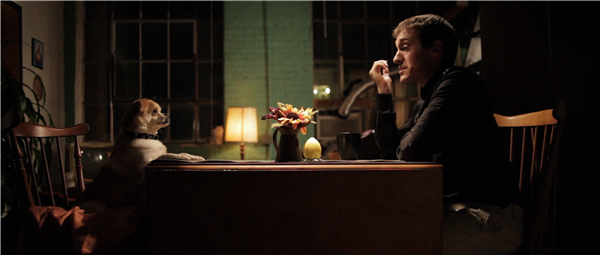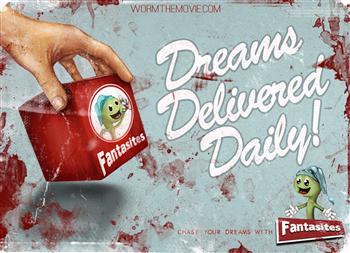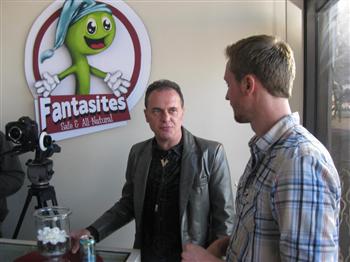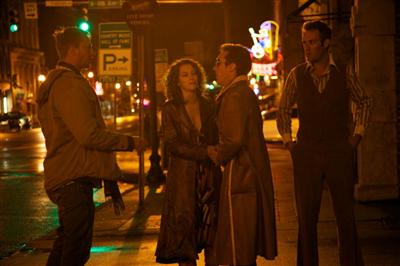Worm, by Doug Mallette
How would you describe your film?
I think it has a bit of an identity crisis. It’s about a world where people don’t dream anymore so they start using a parasite at night to dream again, but it turns out putting worms in your head has some negative side effects. It’s definitely a sci-fi concept, but it’s a romance at heart, dipped in horror and laced with comedy. It’s like a three-eyed kitten. Some people might find it cute, some people might find it disturbing, some people will probably think it should be put down.
What challenges did you/your crew encounter while making the movie?
There was absolutely nothing easy about making Worm. We basically had no money, a tiny crew, limited control over locations, and an absurd amount of schedules to juggle. We couldn’t afford to pay anyone so we were at the mercy of working around everyone’s day jobs and other paying work. We also had actors than were in and out of the state, our lead actress had spine surgery in the middle of shooting, and our 20-day schedule turned into nearly 60. It was nightmarish, a detriment to everyone’s health and sanity, and we loved every minute of it.
What attracts you to the medium of film, as opposed to other forms of art?
So many other forms of art, like music, graphic design, painting, whatever it may be, can be utilized in a film. Film is somewhat all encompassing, swallowing up every other form of art and regurgitating them into one cohesive work. Plus, it’s a much more collaborative effort. There’s something really wonderful about not just having the option, but the responsibility, to rely on other people.
What inspires/influences you?
In my life I’m constantly worrying about the worst possible things that could happen in any given scenario. Those irrational fears are usually what make it onto the screen. I’m also a heavy consumer of films, television, comics and alcohol, so a lot of inspiration comes from those places as well. It can be somewhat of a detriment though. A lot of times I’ll see something that I think is really amazing, and instead of being inspired to do better, I just think “Sh*t, I’ll never make anything that good.”
Are there any particular genres you favor over others?
I like to think I find little bits of each genre that excite me. Worm is definitely a blend of genres, but at heart I’m a total horror junkie. If there’s dismemberment, I’m there.
In the process of film-making, how much of the creativity is found in production? How much improvisation do you find on set?
I’ve found the majority of creativity is found during production. Circumstances beyond your control are usually going to force you to change your plans, but that’s something I’m always open to. Worm was completely improvised, no script, no shot list, very little pre-planning. We’d just play around on set until we found something that worked. It made each take exciting. Then again, it also made post‐production a nightmare.
How did you learn your craft?
I went to film school in Nashville. But I feel like I learned just as much from collaborating with friends who were more experienced, which was basically all of them. I found myself on set just trying to not look like a complete idiot. This eventually either turned into me actually knowing what I was doing or I faked it long enough to convince others that I do.
On what projects are you currently working?
Worm was the first feature from Untrademarked Productions, a company some college friends and I started. The plan is for us to continue making features and hopefully Worm will allow that. We have a script for a feature called Nuts, (That’s right! With an actual script!), and I’d be a happy boy to move onto that next. I’m just not sure that we can make another feature the way we made Worm. We may have exhausted all of our free favors.
What would you say of the place motion pictures have in our culture?
A movie holds whatever place the viewer lets it hold. Films can teach people, they can move or inspire people, they can simply entertain, sometimes they just piss people off. The filmmaker can have whatever agenda they want, but their film is only as powerful as the audience allows.
In terms of motion picture production, what would you like to see from the state of Tennessee? What advantages does the state currently have, and how do you think it could improve?
It feels like there are two categories of recognized filmmaking in Tennessee. You have student films where the community rallies to help you get discounts and stuff as cheap as they can, and then there are the multi-million dollar productions that everyone falls over themselves to join or cater to. Both are incredibly important, but there’s a lot of great stuff in the middle, that could use some help and attention.
How long have you been working in motion pictures?
Not long really. Five, maybe six years. I was a bit late to the game. I’m not one of those filmmakers that had a camera as a kid making 8mm shorts in their backyard. I have a lot of catching up to do.
What themes do you like to explore in film?
I don’t spend a lot of time thinking about theme. I think Worm explores certain themes simply by the fact that the story revolves around a lonely loser trying to find friends and love. That in itself is a theme of sorts, but it’s not something on the forefront of my mind. I make a lot of films about losers coming to grips with the fact that they’re losers, but that might say more about me than about thematic intention.
What advice do you have to aspiring filmmakers?
I’m still in the “accepting advice” stage, so if they have any words of wisdom for me, I’m listening. I’d say be reckless and stupid. Just start doing it; don’t wait until the right moment. It might be dumb, but it’s a good dumb. Be dumb, I guess. I’m dumb.
What do you see as the future of film?
It’s a really exciting time. The variety of films is ridiculous. Big budget spectacles are getting bigger and more immersive, but it’s never been easier to make your own film. I think the range of films from mega to zero budgets will continue to explode, and it’s just going to continue to be easier and easier to get your own stuff in front of an audience.

















